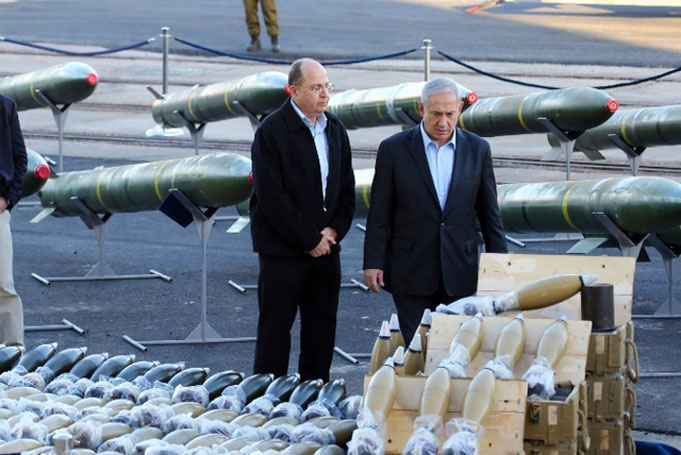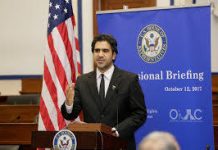U.S. enforcement of Iran arms embargo slipped during nuclear talks: sources
Reuters/By Yeganeh Torbati/October 05/15
Addressing concerns that a landmark nuclear deal reached this year could boost Iran’s military power, the Obama administration reassured critics that it would maintain and enforce its remaining tough sanctions against the country.
Yet the U.S. government has pursued far fewer violations of a long-standing arms embargo against Iran in the past year compared to recent years, according to a review of court records and interviews with two senior officials involved in sanctions enforcement. The sharp fall in new prosecutions did not reflect fewer attempts by Iran to break the embargo, the officials said. Rather, uncertainty among prosecutors and agents on how the terms of the deal would affect cases made them reluctant to commit already scarce resources with the same vigor as in previous years, the officials said.
The more relaxed enforcement raises questions over how strictly the arms embargo and other remaining sanctions will be applied in future, since the nuclear deal still needs to be implemented and Iran will likely remain sensitive to a tough sanctions regime. In the 2014-15 fiscal year, which ended on Sept. 30, U.S. law enforcement officials filed fresh charges just twice against those suspected of attempting to smuggle weapons and related technology from the United States to Iran, according to court records. Eight such cases were brought in 2013-14. By comparison, around 10 to 12 such cases were brought in each of the preceding six years.
“There’s been a precipitous drop-off,” said one of the senior U.S. officials, who declined to be identified. “The facts are the facts – there’s no other explanation.”
The official added there was already a “reticence” in some agencies and U.S. federal prosecutors’ offices to pursue the cases because they are so tough to build and time-consuming.
“And if we’re going to normalize things with Iran soon, people are asking, ‘Is it worth it?'”The nuclear deal, reached in July after two years of concerted negotiations, tasks Iran with dismantling much of its nuclear infrastructure in return for the removal of many of the international sanctions placed on it over the past five years.
The U.S. sanctions being lifted are largely nuclear-related measures that barred other countries from dealing with Iran’s banking and oil sectors. U.S. sanctions for Iran’s alleged human rights violations and support for militant groups remain in place, as do measures barring U.S. persons from most trade with Iran. A United Nations embargo on conventional weapons will be lifted in five years, and a U.N. embargo on ballistic missiles in eight. Multiple U.S. laws and regulations still bar the export of U.S. goods and technology to Iran, especially anything related to defense.
Obama administration officials say they continued to aggressively enforce sanctions against Iran throughout the negotiations, are still doing so, and will strictly enforce the remaining sanctions after the deal is implemented. “The Justice Department continues to pursue criminal prosecutions against those that seek to circumvent U.S. sanctions involving Iran and other export controls,” said Marc Raimondi, a spokesman for the department, adding there were numerous ongoing cases. A senior Commerce Department official said its Office of Export Enforcement “continues to vigorously enforce sanctions on Iran” and that Iran cases make up the bulk of its current file.
A spokesperson for Immigration and Customs Enforcement, a Department of Homeland Security agency, did not respond to a request for comment. Elizabeth Bourassa, a spokeswoman for the Treasury Department’s Office of Terrorism and Financial Intelligence, said the department had enforced sanctions at the same pace since a framework deal was announced with Iran in April as it did in the preceding year and a half.
Treasury’s Office of Foreign Assets Control (OFAC) enforces a wide variety of sanctions beyond non-proliferation, including financial, terrorism, and oil measures.
“Since the start of the negotiating period, OFAC imposed sanctions on more than 100 Iran-related individuals and entities, concluded more than 20 Iran-related enforcement actions, and assessed approximately $525 million in penalties for violations of Iran-related sanctions,” Bourassa said.
VIOLATIONS
In the past decade, individuals have attempted to export a range of U.S. goods with military applications to Iran, such as aircraft parts, night-vision goggles, and a horizontal lathe used to make high-grade steel, according to court documents. In one of the cases in the most recent fiscal year, U.S. officials charged several members of what they called an “Iranian procurement network” for illegally exporting $24 million worth of goods to Iran, including high-tech U.S.-origin electronics.
In the other case, an Oklahoma City man was charged in October 2014 with smuggling firearm shell casings to Iran. The second senior law enforcement official told Reuters that as a deal with Iran grew closer in the past year, front-line agents and prosecutors who enforce Iran sanctions followed the situation closely, carefully weighing whether it was worth it to open new investigations.
Iran arms embargo cases can be highly complex, specialized, time-consuming and sometimes involve high-risk undercover operations, the official said. Some prosecutors and agents were wary of investing years of time and money in cases that might suddenly become moot, said the official, who spoke on condition of anonymity. “No one distributed a memo saying, ‘Don’t work these cases’ – no one is that stupid,” the official said. “But with this deal coming, everything was thrown up in the air, everyone was looking for guidance.”
There are also indications that this summer, as negotiations with Iran reached a critical point, Obama administration officials were concerned with how sanctions enforcement could affect the talks.
In a June 2015 email seen by Reuters, a Treasury official contacted an official from New York’s Department of Financial Services expressing alarm about an Iran-related investigation. “Any actions that are taken in connection with sanctions violations pertaining to Iran may have serious impacts on the ongoing negotiations and U.S. foreign policy goals and objectives,” wrote the official, whose name was redacted in the email.
Representative Patrick Meehan, a Republican critic of the Iran deal and a former federal prosecutor, said the drop in prosecutions and the letter from Treasury indicated that the Obama administration relaxed sanctions to protect the negotiations. “There should have been clear signals sent from the administration that there is to be no interruption, that the law is clear and unambiguous,” Meehan said. He authored a bill that would prevent sanctions relief for Iran until it pays restitution to victims of Iranian-backed attacks, prompting the White House to say Obama would veto any legislation that prevents implementation of the deal.
“There’s a subtle way of simply chilling out the willingness of investigators to pursue the cases in the first place,” Meehan said. “I look at the pattern and that’s what disturbs me.”
(Additional reporting by Brett Wolf in St. Louis and Jeff Mason in Washington; editing by Stuart Grudgings)




















